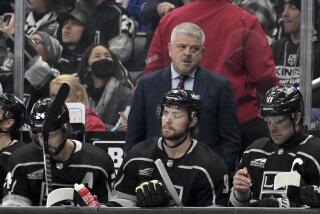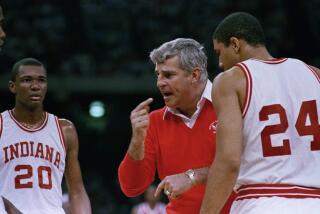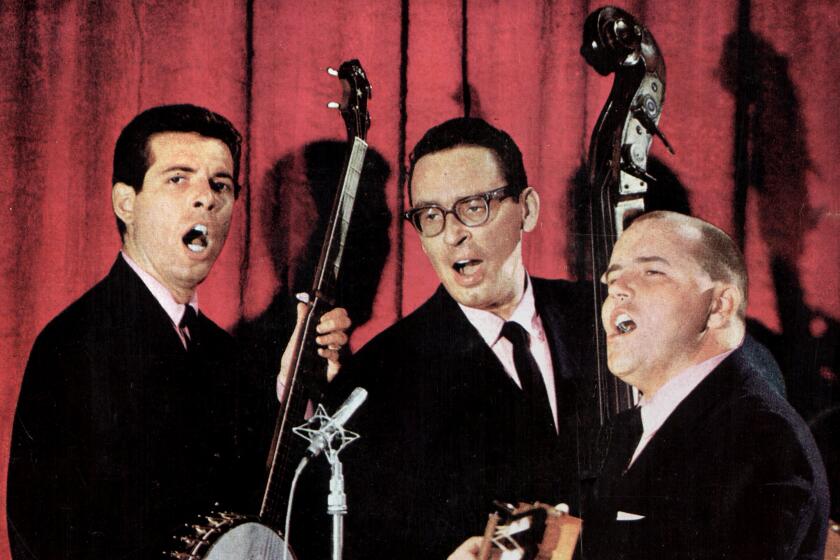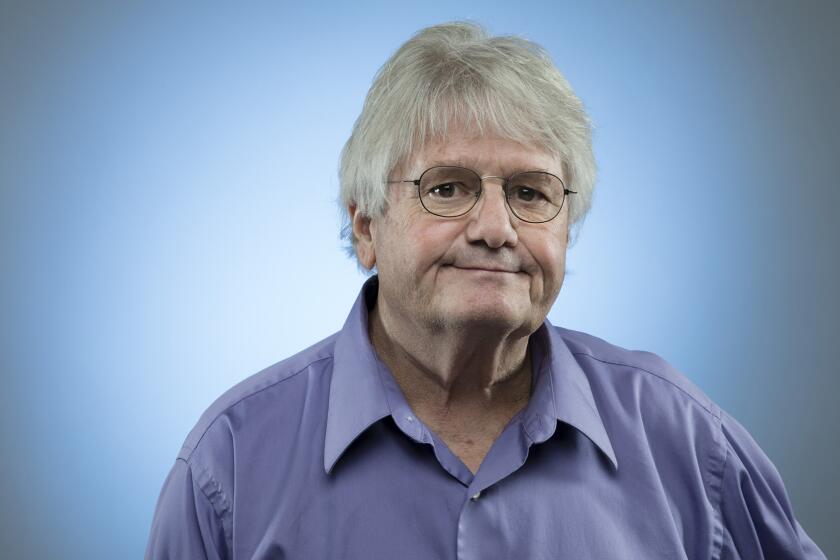Pat Burns dies at 58; three-time National Hockey League coach of the year
Pat Burns, who made an unconventional and accidental transition from police officer to hockey coach and was the only man voted the National Hockey League’s coach of the year three times, died Friday at a hospice in Sherbrooke, Canada. He was 58.
He had inoperable lung cancer, for which he had refused treatment after previously battling colon and liver cancer.
Burns’ first career as a police officer gave him unquestioned authority behind the bench. He was a disciplinarian and often wore a forbidding scowl, which served him well in the NHL.
The Montreal native guided the New Jersey Devils to the Stanley Cup in 2003, capping a career in which he was chosen the league’s top coach in 1989 with the Montreal Canadiens, in 1993 with the Toronto Maple Leafs and in 1998 with the Boston Bruins. He won 501 games over 14 seasons and had a .573 winning percentage.
But Burns showed compassion toward his players and had a lighter side. He was an accomplished guitarist — he played backup on a country CD recorded by Canada’s Good Brothers — and collected and rode motorcycles.
Burns was coaching the Devils in the spring of 2004 when he learned that he had colon cancer. He hoped to return to the bench in 2005, but he was stricken by liver cancer. The Devils employed him as a special assignment scout, and he was a morning radio personality for Montreal’s CKAC.
Early in 2009, he developed lung cancer and decided against undergoing chemotherapy again.
Luc Robitaille, the former Kings Hall of Fame forward who is now the team’s president of business operations, said he spoke to Burns’ wife, Line, every couple of weeks.
“He meant a lot to me. He was my coach in juniors and we stayed close,” Robitaille said Friday. “He fought for a long, long time. The doctors weren’t giving him this long.
“Definitely the last little while it was really, really hard. He wanted to enjoy every moment, but it was hard for him. They were getting ready.
“This is a big loss for the world of hockey.”
Burns made one of his last public appearances in March at the dedication of an arena named for him that is scheduled to open next year on the campus of Stanstead College, on the Quebec side of the Canada-Vermont border.
Thinner by about 50 pounds, his voice raspy, he spoke without self-pity.
“As your life gets closer to the end, you realize your body gets weaker, your mind gets stronger but your heart gets softer,” he said.
“I probably won’t see the project to the end, but let’s hope I’m looking down on it and see a young Wayne Gretzky or Mario Lemieux.”
Besides his wife, he is survived by a son, Jason; a daughter, Maureen; a stepdaughter, Stephanie; a stepson, Maxime; and a grandson. His family was in the audience at that ceremony in March.
“I know my life is nearing its end and I accept that,” Burns said. “As for my career, I always said to my kids, ‘You don’t cry because it’s over, you’re happy because it happened.’ That’s the main thing. I’m very happy that it happened.”
Burns was born April 4, 1952, in Montreal. His father died when Burns was young, and he moved with his mother and a sister to northern Quebec and later to Gatineau, near Ottawa. He played junior hockey but wasn’t drafted by an NHL team and found himself at a crossroads after he turned down an invitation to the St. Louis Blues’ training camp.
He didn’t see himself taking a 9-to-5 job or working at the local paper mill, a major employer. The Gatineau police chief, a family friend, suggested he join the force.
“I said something like, ‘What, are you crazy?’” Burns told the Boston Globe in 1997. “And then he said, ‘You know, we’ve got motorcycles.’ And that was it. I was sold.”
Burns worked in Ottawa and Gatineau, breaking up bar brawls and once infiltrating and busting up a drug ring run by prison guards. He delivered babies and investigated traffic accidents, killings and suicides.
Burns’ life took an unexpected turn when a friend asked him to fill in as the coach of a local youth team. He was successful, and from bantams and peewees he moved up to the Junior A level in Hull, Canada, while still working his police job.
He was ready to give up coaching and return to policing in the summer of 1985 but was persuaded to stay by Gretzky, who had become an owner of the team in Hull. Burns took a leave from the police force and continued to coach, leading Hull — with Robitaille — to the final of the Memorial Cup, Canada’s junior championship.
Burns was hired by the Canadiens’ farm team in 1987 and spent one season there before being promoted to Montreal. He won his first coach-of-the-year award in his first season, 1988-89.
From there he moved on to Toronto and led the Maple Leafs to the conference finals against the Kings in 1993. He later coached Boston and then New Jersey, leading the low-scoring Devils to the championship in 2003.
“I have only two things that have been my life. That is police work and hockey,” he told Toronto Life magazine in 1995. “I am not a university graduate. I don’t have a trade. If I lose my skates, I am in trouble.”
A Facebook campaign to elect him to the Hockey Hall of Fame this year drew more than 70,000 supporters, but he was not among the honorees.
More to Read
Start your day right
Sign up for Essential California for the L.A. Times biggest news, features and recommendations in your inbox six days a week.
You may occasionally receive promotional content from the Los Angeles Times.







